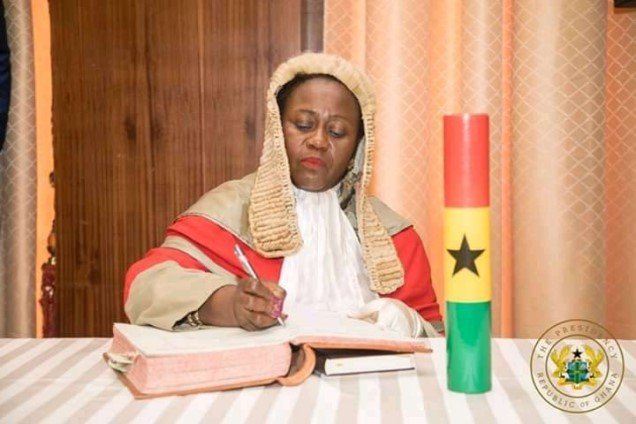
Gertrude Araba Essaba Torkornoo, Chief Justice
President Nana Addo Dankwa Akufo-Addo yesterday swore into office Justice Gertrude Araba Esaaba Sackey Torkornoo as the country’s new Chief Justice.
She takes over from Justice Kwasi Anin Yeboah who retired in May 2023. This makes her the third female Chief Justice in the history of Ghana, coming after Justice Georgina Theodora Wood and Sophia Akuffo.
Justice Gertrude Torkornoo’s nomination was unanimously approved by Parliament on Wednesday, June 7, 2023.
Speaking during the swearing-in ceremony at the Jubilee House, the President urged the new Chief Justice to strive to be guided by the tenets of fairness, diligence, deep sense of respect for the rule of law and continuation of the modernisation of judicial functions and the expansion of infrastructure.
President Akufo-Addo highlighted Torkornoo’s qualifications and distinguished years of service in the Judiciary, stating that she possesses the qualities necessary to inspire public confidence in the judicial system.
The President said her appointment was not a difficult task as she possesses the qualities needed to lead the Judiciary.
“The choice of Justice Gertrude Torkornoo as the 15th Chief Justice was not a particularly difficult one to make in view of her level of qualification, the number of years spent with distinction at the bench, and the superior court of judicature totally 19 years,” the President said.
Full grasp
The President noted that the new CJ has “full grasp of the intricacies” of judicial administration. He, therefore, expressed optimism that she will be an effective leader of the Judiciary by zealously defending its independence, constantly upholding its dignity, and be a worthy successor to Justice Anin Yeboah.
President Akufo-Addo said the growth of the nation demands that “we have a Judiciary that commands the respect of the people by the quality of its delivery of justice, as well as by the comportment of its judges”.
As result, the President emphasised the need to have judges who are honest, and possess integrity and a sound knowledge of the law.
The situation where judges proffer judgments on the basis of decisions from lower courts and cite them as law, according to the President, is not acceptable, and even less so, when judges cite no authority at all for their rulings, and give orders without reasons.
“You must be learned, know your case law, and ensure your decisions and judgments are properly motivated in accordance with the principle of stare decisis, the doctrine of precedent, which has been the bedrock for the evolution of the common law,” he stressed.
Commitment
The Chief Justice made a commitment to leverage technology to improve the efficiency of the Judiciary.
Despite efforts made in the past two decades to automate court operations, only 62 percent of courts currently utilize computers as part of their workflow.
Justice Torkornoo stressed the need to acquire electronic devices for capturing court records and establish a networked infrastructure among registries and stakeholders to enable the next level of automation.
“Two decades since tackling the issue of automation, only 62 percent of courts use computers as part of their work. Computerization is only the first process of the automation of court processes. After acquiring electronic devices to capture records of court processes, the registry, and offices of stakeholders must be networked in other to allow for the next level of automation.
“This is a national burden and we are slowed by any sluggishness in the nation’s digitalization drive. Currently, our records show that only 26 percent of courts are networked and only 12 percent of courts have been brought into the bracket of full automation in the operation through the digitalization of their processes,” Justice Torkornoo added.
Career
Justice Gertrude Araba Esaaba Sackey Torkornoo (Mrs.) joined the Judicial Service in 2004 as one of the first Justices of the Commercial Division of the High Court. She has been active in the core reform agenda and activities of the Judiciary and the Judicial Service of Ghana (JSG) since 2005.
The organs through which these reforms have been implemented have included the specialized divisions of the High Court, the Judicial Training Institute, administrative committees set up to ensure the implementation of the automation and digitalization of court work and administration of JSG, the streamlining of alternative dispute settlement mechanisms in justice delivery, and communication channels between the Judiciary and its stakeholders.
The leadership roles Justice Sackey Torkornoo has played in ensuring the achievement of judicial reforms include being vice chair of the E-Justice Oversight and Implementation Committee (E-Justice OC) from its inception in 2019 and chair of the E-Justice OC since August 2021.
She has served as a member of the faculty and Governing Board of the Judicial Training Institute, vice chair of the Internship and Clerkship Committee of the Judiciary since 2012, Supervising Judge of the Commercial Division of the High Court since 2013, member and chair of the E-Judgment Committee since 2010, member and chair of the Publications and Editorial Committee of the Association of Magistrates and Judges of Ghana since 2006, and member and chair of various ad-hoc committees needed for the smooth administration of the work of JSG.
Justice Sackey Torkornoo has served as a judicial leader in the development and oversight of several reform projects of the Judiciary involving the European Union, USAID, DFID, and collaborations with other African countries.
She has also been a member of the Law Reform Commission since 2016.





